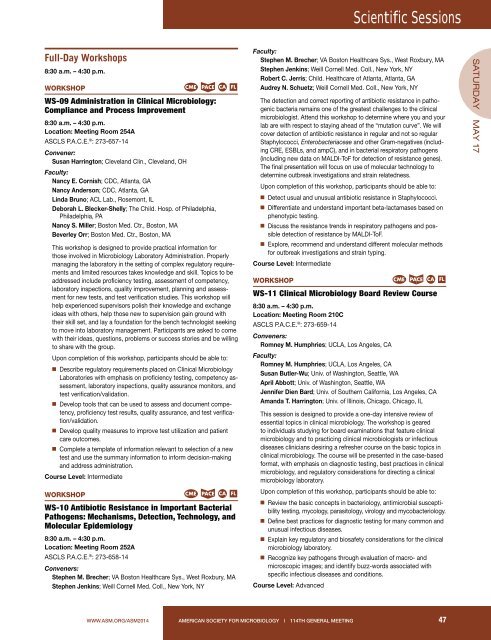asm2014_Comp_Web
asm2014_Comp_Web
asm2014_Comp_Web
Create successful ePaper yourself
Turn your PDF publications into a flip-book with our unique Google optimized e-Paper software.
Scientific Sessions<br />
Full-Day Workshops<br />
8:30 a.m. – 4:30 p.m.<br />
WORKSHOP<br />
WS-09 Administration in Clinical Microbiology:<br />
<strong>Comp</strong>liance and Process Improvement<br />
8:30 a.m. – 4:30 p.m.<br />
Location: Meeting Room 254A<br />
ASCLS P.A.C.E. ® : 273-657-14<br />
Convener:<br />
Susan Harrington; Cleveland Clin., Cleveland, OH<br />
Faculty:<br />
Nancy E. Cornish; CDC, Atlanta, GA<br />
Nancy Anderson; CDC, Atlanta, GA<br />
Linda Bruno; ACL Lab., Rosemont, IL<br />
Deborah L. Blecker-Shelly; The Child. Hosp. of Philadelphia,<br />
Philadelphia, PA<br />
Nancy S. Miller; Boston Med. Ctr., Boston, MA<br />
Beverley Orr; Boston Med. Ctr., Boston, MA<br />
This workshop is designed to provide practical information for<br />
those involved in Microbiology Laboratory Administration. Properly<br />
managing the laboratory in the setting of complex regulatory requirements<br />
and limited resources takes knowledge and skill. Topics to be<br />
addressed include proficiency testing, assessment of competency,<br />
laboratory inspections, quality improvement, planning and assessment<br />
for new tests, and test verification studies. This workshop will<br />
help experienced supervisors polish their knowledge and exchange<br />
ideas with others, help those new to supervision gain ground with<br />
their skill set, and lay a foundation for the bench technologist seeking<br />
to move into laboratory management. Participants are asked to come<br />
with their ideas, questions, problems or success stories and be willing<br />
to share with the group.<br />
Upon completion of this workshop, participants should be able to:<br />
■ Describe regulatory requirements placed on Clinical Microbiology<br />
Laboratories with emphasis on proficiency testing, competency assessment,<br />
laboratory inspections, quality assurance monitors, and<br />
test verification/validation.<br />
■ Develop tools that can be used to assess and document competency,<br />
proficiency test results, quality assurance, and test verification/validation.<br />
■ Develop quality measures to improve test utilization and patient<br />
care outcomes.<br />
■ <strong>Comp</strong>lete a template of information relevant to selection of a new<br />
test and use the summary information to inform decision-making<br />
and address administration.<br />
Course Level: Intermediate<br />
WORKSHOP<br />
WS-10 Antibiotic Resistance in Important Bacterial<br />
Pathogens: Mechanisms, Detection, Technology, and<br />
Molecular Epidemiology<br />
8:30 a.m. – 4:30 p.m.<br />
Location: Meeting Room 252A<br />
ASCLS P.A.C.E. ® : 273-658-14<br />
Conveners:<br />
Stephen M. Brecher; VA Boston Healthcare Sys., West Roxbury, MA<br />
Stephen Jenkins; Weill Cornell Med. Coll., New York, NY<br />
Faculty:<br />
Stephen M. Brecher; VA Boston Healthcare Sys., West Roxbury, MA<br />
Stephen Jenkins; Weill Cornell Med. Coll., New York, NY<br />
Robert C. Jerris; Child. Healthcare of Atlanta, Atlanta, GA<br />
Audrey N. Schuetz; Weill Cornell Med. Coll., New York, NY<br />
The detection and correct reporting of antibiotic resistance in pathogenic<br />
bacteria remains one of the greatest challenges to the clinical<br />
microbiologist. Attend this workshop to determine where you and your<br />
lab are with respect to staying ahead of the “mutation curve”. We will<br />
cover detection of antibiotic resistance in regular and not so regular<br />
Staphylococci, Enterobacteriaceae and other Gram-negatives (including<br />
CRE, ESBLs, and ampC), and in bacterial respiratory pathogens<br />
(including new data on MALDI-ToF for detection of resistance genes).<br />
The final presentation will focus on use of molecular technology to<br />
determine outbreak investigations and strain relatedness.<br />
Upon completion of this workshop, participants should be able to:<br />
■ Detect usual and unusual antibiotic resistance in Staphylococci.<br />
■ Differentiate and understand important beta-lactamases based on<br />
phenotypic testing.<br />
■ Discuss the resistance trends in respiratory pathogens and possible<br />
detection of resistance by MALDI-ToF.<br />
■ Explore, recommend and understand different molecular methods<br />
for outbreak investigations and strain typing.<br />
Course Level: Intermediate<br />
WORKSHOP<br />
WS-11 Clinical Microbiology Board Review Course<br />
8:30 a.m. – 4:30 p.m.<br />
Location: Meeting Room 210C<br />
ASCLS P.A.C.E. ® : 273-659-14<br />
Conveners:<br />
Romney M. Humphries; UCLA, Los Angeles, CA<br />
Faculty:<br />
Romney M. Humphries; UCLA, Los Angeles, CA<br />
Susan Butler-Wu; Univ. of Washington, Seattle, WA<br />
April Abbott; Univ. of Washington, Seattle, WA<br />
Jennifer Dien Bard; Univ. of Southern California, Los Angeles, CA<br />
Amanda T. Harrington; Univ. of Illinois, Chicago, Chicago, IL<br />
This session is designed to provide a one-day intensive review of<br />
essential topics in clinical microbiology. The workshop is geared<br />
to individuals studying for board examinations that feature clinical<br />
microbiology and to practicing clinical microbiologists or infectious<br />
diseases clinicians desiring a refresher course on the basic topics in<br />
clinical microbiology. The course will be presented in the case-based<br />
format, with emphasis on diagnostic testing, best practices in clinical<br />
microbiology, and regulatory considerations for directing a clinical<br />
microbiology laboratory.<br />
Upon completion of this workshop, participants should be able to:<br />
■ Review the basic concepts in bacteriology, antimicrobial susceptibility<br />
testing, mycology, parasitology, virology and mycobacteriology.<br />
■ Define best practices for diagnostic testing for many common and<br />
unusual infectious diseases.<br />
■ Explain key regulatory and biosafety considerations for the clinical<br />
microbiology laboratory.<br />
■ Recognize key pathogens through evaluation of macro- and<br />
microscopic images; and identify buzz-words associated with<br />
specific infectious diseases and conditions.<br />
Course Level: Advanced<br />
SATURDAY MAY 17<br />
WWW.ASM.ORG/ASM2014 AMERICAN SOCIETY FOR MICROBIOLOGY | 114TH GENERAL MEETING 47


